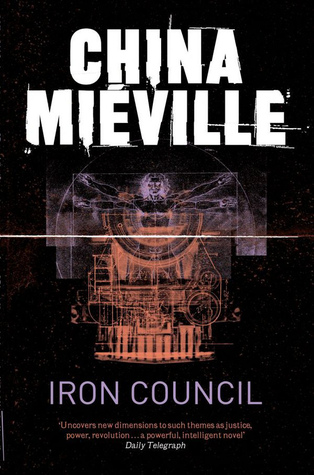 Iron Council, China Miéville
Iron Council, China Miéville
Originally reviewed 1st May, 2009
I didn’t enjoy Iron Council anywhere near as much as I did Miéville’s other books. I’m not sure quite why, to be honest. Parts of it irritated me stylistically — the large section which follows Judah in the middle, mainly — but that wouldn’t automatically lower my enjoyment of the whole book. I didn’t find the writing as descriptive, although there were some very interesting descriptions, mostly the parts where the train goes through the stain. Whyever it was, I just didn’t get into this book that much. I did enjoy it, and if you enjoy the other Bas-Lag books and know what to expect from Miéville’s writing, then I’m sure you’d get a lot out of it. I just didn’t.
Part of it is that it isn’t as focused. It’s not just one city, but two. The train-city is built up and described, but I don’t feel as strongly connected and rooted to it as I do to New Crobuzon in Perdido Street Station and Armada in The Scar. If the cities are characters, Iron Council falls a little flat. There are interesting characters, mostly Cutter and Judah, who I think I got more attached to than other characters of similar importance in the other two Bas-Lag books. I think Cutter was the character I got most attached to. Judah being all saint-like all the time kind of made me want to hit him sometimes, but Cutter’s feelings were so honest and open in the narrative.
In terms of plot, I spent a lot of time wondering where it was actually going. It never came together as strongly as I expected it to, and the climax wasn’t much of a climax. The end is appropriate, and makes sense, but I think the book could have been edited/reordered for better effect.
Rating: 3/5

Of all his books, this was the one where his socialist streak showed most clearly. It felt like a thought experiment rather than a novel – what if a socialist uprising were to occur? There’s a certain hopelessness and pessimism in the novel – it is aggrieved at the futility of essentially powerless people fighting against the system.
China Mieville is clearly a brilliant, highly intelligent man. He knows what’s right and wrong, can see the injustice in the world, and, in this book, rages at the impotence of people to change things.
I wonder what the book would be like if he wrote it now. Whether the rise and fall or Syriza in Greece, and the rise of Corbyn would make him more pessimistic, or less.
I’d be interested to reread it now in light of those developments! Also in light of being more politically aware in general — I read and reviewed this, yeesh, when I was nineteen.